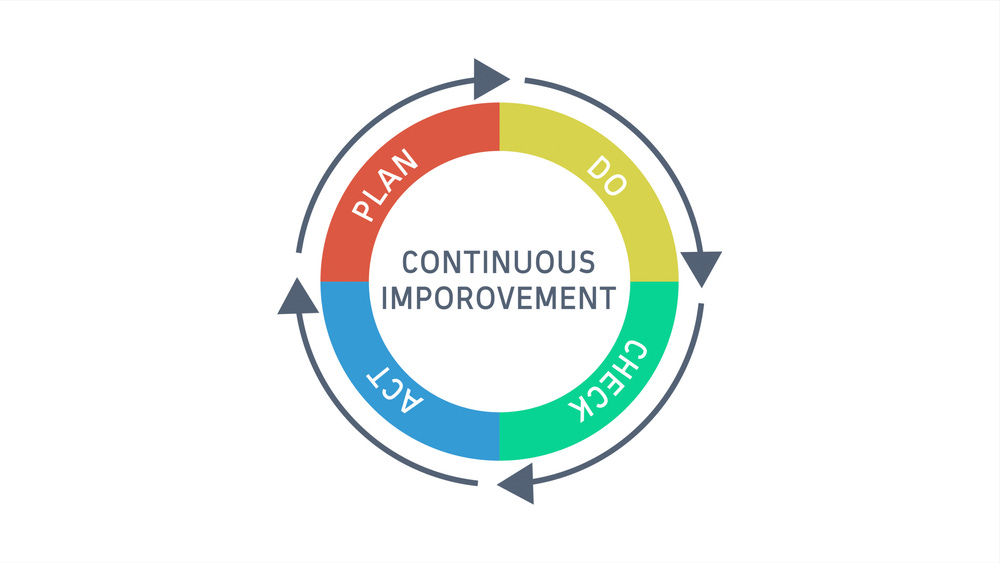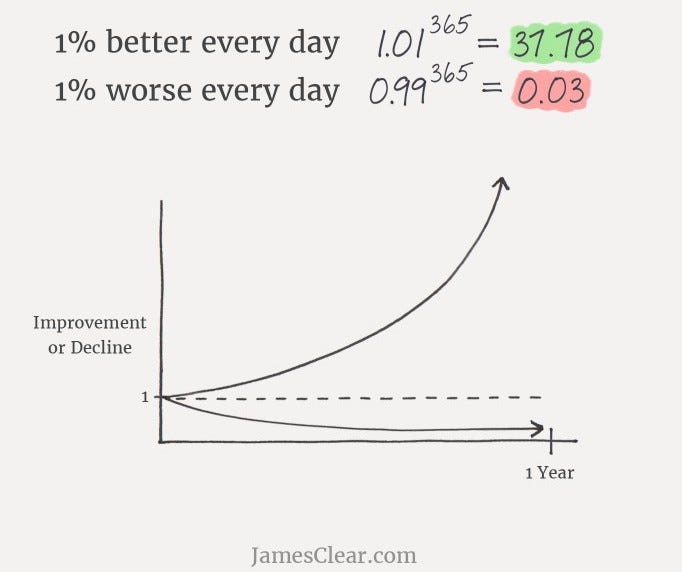The Invincible Power of Compounded Growth: Your Key to Mastery
Unlocking the Infinite Game of Continuous Improvement
Let’s embark on a journey through time!
Picture an ancient kingdom, ruled by a wise and charismatic King. His realm was so vast, even the view from the highest peak couldn't capture its full expanse.
Blessed with abundant sun and rain, the kingdom's fields were bountiful, filling the granaries to the brim. But this prosperity came at a hefty price - uncountable, famished rats.
One day, a mysterious foreigner arrived, promising to rid the king of his rodent problem. In return, he proposed a seemingly modest compensation:
“Your Highness, I propose a simple game of Chess.
On the first day, I ask for a single grain of your plentiful harvest to be placed on the first square of the chessboard.
On the second day, two grains on the second square.
On the third, four grains on the third square. And so it continues, doubling each day...”
The king, amused by the stranger's request, agreed. The pests were dealt with, and the stranger returned to claim his prize.
Can you guess what happens next?
As Albert Einstein famously said,
“Compound interest is the eighth wonder of the world. He who understands it, earns it … he who doesn’t … pays it.”
Let's delve into the power of this 'eighth wonder' and how it can transform your life!
Part 1 - The Magic of Compound Interest:
Let's return to our story. As the grains doubled on each square of the chessboard, the king soon realized the enormity of his promise. On the 5th day, he owed 16 grains. By the 10th day, the amount had grown to 512 grains. And by the 21st day, the king owed over a million grains - a thousand times the amount he owed just 10 days earlier.
By the time they reached the last square, the amount of grain would be astronomical, far exceeding the king's vast granaries. This, my friends, is the power of compound interest!
Small, consistent increases can lead to massive results over time.
But compound interest isn't just about money or grains of wheat. It’s a natural law of the universe that can be applied to our skills and personal development as well. Just like the grains on the chessboard, when we make small, consistent improvements in our abilities, the results can be just as dramatic.
This principle isn't just theoretical - it's used in practical ways in many fields. For example, in engineering and project management, the Japanese concept of 'Kaizen', or continuous improvement, is often applied.
By making small, incremental changes to processes over time, companies can achieve significant improvements in efficiency and productivity.
The same principle applies to our personal lives. Whether it's learning a new language, playing an instrument, or improving our physical fitness, small, consistent efforts can lead to significant progress over time. This is the power of compound interest in action!
Part 2 - Kaizen: The Art of Continuous Improvement:
Now that we understand the power of compound interest, let's dive a bit deeper into how we can apply the magic of compound interest to our personal growth with the powerful approach of the Kaizen philosophy.
Kaizen is all about taking baby steps: incremental positive changes on a regular basis.
It's not about making huge leaps forward, but rather about consistent, steady progress. Slow and steady wins the race, after all…
This philosophy is often implemented through the PDCA (Plan-Do-Check-Act) cycle, a systematic process for achieving continuous improvement that ensures we're always moving forward, even if it's just by a small amount each time.
Here's how it works:
Plan: Identify an opportunity for improvement and plan a change.
Do: Implement the change on a small scale.
Check: Measure the impact of the change and check whether it made a difference.
Act: If the change was successful, implement it on a wider scale. If not, go back to the planning stage and try a different approach.
This cycle is repeated over and over, leading to continuous improvement over time. It's a perfect example of the power of compound interest in action.
One great way to apply the PDCA cycle is through habit building. First you Plan your way into a new Habit. Then you start taking small steps in the right direction. Day by day you check what’s good and what could be improved. Then you decide if you should go all in or back to the drawing board. I’ve done this countless times, from thinking about implementing a new tool at work to going to the gym.
By applying this approach to our personal development, we can harness the power of compound interest to achieve significant growth over time. So why not give it a try? Start with a small change you want to make, and see where the PDCA cycle takes you.
Part 3 - Playing the Infinite Game:
While the Kaizen philosophy and PDCA cycle help us make continuous improvements, it's also important to consider the type of game we're playing in life
Throughout our childhood, we got used to playing games with a well-defined set of rules. When the time is up or when someone reaches a previously-determined threshold, the game is over. But in life, there are no pre-defined rules. Once you finish school and take out the training wheels, you are on your own.
This brings us to the concept of two types of games, as described by Simon Sinek, the author of “Start with Why”:
Finite Games - Games with a well-known ending, such as a Basketball game.
Infinite Games - Games with no pre-defined ending, such as business or politics.

As Alex Hormozi would say, the player who can stay in the game the longest will always end up winning. It’s the ability of getting in the ring day in and day out, irrespective of the circumstances, that puts winners on the path to greatness.
If you can adopt this mindset, you will become invincible in your field. So why not start today? Don’t think in terms of hours or days. Think in terms of decades
Conclusion:
Today, we’ve learned that the power of compound interest is more than just a mathematical concept. It's a powerful force that governs many natural processes. Keeping this on the back of our minds will help us not fall prey to those who know how to harness the power of the eight wonder of the World.
We also explored ways to incorporate the concept of Kaizen into our daily lives. By making small tweaks at every step, and using the PDCA Framework as a guide, we can journey towards greatness.
Finally, we’ve thought about the concept of finite and infinite games, and the importance of finding games we would enjoy playing for the rest of our lives. This is the secret sauce of the greats in every field.
Thank you for joining me on this trip, and I hope you’ll start applying these principles to your own life today! Don’t forget to ask yourself:
“What are the things that ignite such a fire in your belly that you'd do them even when you're exhausted?”
I am dying to know more about your experiences with continuous improvement in your personal and professional lives, and would like to invite you to comment with suggestions for future topics and hot takes on this edition!
Pit Stop Discoveries: my top findings for the Week!
This edition was inspired in one of this week’s discoveries. Can you spot which?
Time-Saving Habits with Ali Abdaal: Ever feel like there aren't enough hours in the day? Ali Abdaal shares 8 Simple Habits That Save Him 20+ Hours a Week. Tune in to reclaim your time!
Stable Doodle - A Paint-like AI Tool: Unleash your inner artist with Clipdrop's Stable Doodle. Sketch your ideas and watch as this AI tool transforms them into incredible designs.
Sam Harris on Mental Strength: How do you build an unbreakable mind? Sam Harris reveals his secret in The Secret To Building Unbreakable Mental Strength.
Kobe Bryant's Approach to Improvement: The late Kobe Bryant had a mathematical approach to improvement, showing the power of compound interest applied to Atomic Habits. Check out this insightful Twitter thread by Billy Oppenheimer.
Physical and Neural Activity Connection: Ever wondered about the intimate relationship between physical and neural activity? Dan Go explores why the Jocks vs. Nerds dichotomy shouldn't exist in this Twitter post.
The Ugly Truth About Japanese Society: Japan is often seen as a model society, but is it really? This video delves into the quirks and complexities of Japanese culture. Prepare for some surprises! (I REALLY recommend this guy’s channel, by the way! He’s a fellow Brazilian introvert living in Japan who films the streets of Tokyo and narrates the quirks of Japanese culture and history)
Stay tuned into my rock 'n' roll journey through these social media channels:
YouTube Channel: Where rock meets reality. Click here
Merch Store: Where poetry meets profit. Click here
Twitter: For when 280 characters are enough to capture a moment on the road. Click here
Anticoach: My website about no-nonsense self-development. Click here
Instagram: For those insta-worthy moments on the journey. Click here
LinkedIn: Where business meets the beat. Click here
And that's it for this week's edition of "Rock n’ Road to Success"! Until next time, keep rocking and rolling towards your dreams! 🤘












